Payment delays have remained largely stable and payment duration improved. Bankruptcy and failed collection attempts remain top reasons for write-offs.
Survey results highlight small improvements for China in 2018 – late payments were reported less frequently, there is a minor decline in the average proportion of overdue B2B invoices and a faster invoice to cash turn-around was observed. However, the impact of late payment cannot be denied with a notable percentage of respondents reporting revenue loss. Bankruptcy and failed collection attempts remain the top reasons for write-offs and consumer durables is once more a problematic sector.
Long-term business relationships rewarded with credit sales
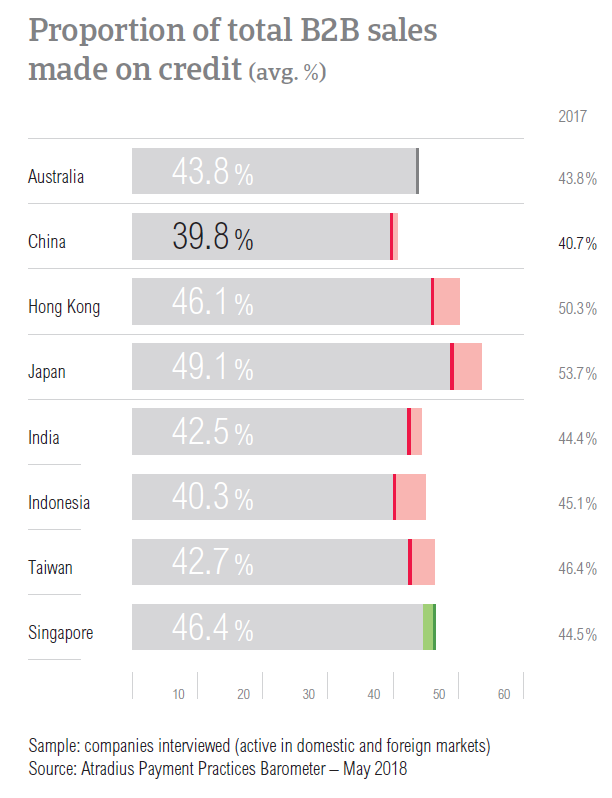
Historically, respondents in China have been the most averse to selling on credit terms in the Asia Pacific region. 2018 survey results point to the same conservative stance with only 39.8% of B2B sales made on credit. There remains a greater reluctance to sell on credit to foreign B2B customers than to domestic B2B customer (32.5% versus 47.1%).
Chinese respondents seem to be granting trade credit to their domestic B2B customers due to their familiarity with domestic business practices, to nurture long-term business relationships and because they wish to grow their businesses domestically. Moreover, selling on credit is seen as a way to reward loyalty and attract new customers. When asked about the main reasons for refusing credit sales to their domestic B2B customers, 60% of respondents said that this is due to a lack of information on the customers’ business or payment performance and 40% said that it is because of the financial weakness of the customer.
We sell on credit because we have a long-term cooperation with most of our domestic customers and this comes with a certain degree of trust.
Chinese companies mainly grant trade credit to their foreign B2B customers to further open up sales and expand their international activity. Long-term cooperation seems to also influence this decision as it helps build trust and provides insight into the customers’ payment behaviour. Respondents in China mainly refuse credit sales to their foreign B2B customers because of high currency risk (mentioned by 55.6% of respondents) and high economic and political risk in the customer’s country (mentioned by 38.9% of respondents).
What we are trying to achieve with trade credit in our transactions with foreign B2B customers is to further open up sales and expand our activity internationally.
The lowest DSO figure in Asia Pacific
The percentage of Chinese respondents who reported frequent late payments by their domestic and foreign B2B customers declined from 95.0% in 2017 to 90.4% this year. There was not much difference in the frequency of late payments by domestic and foreign B2B customers.
The proportion of overdue B2B invoices in China also declined slightly from an average of 46.0% in 2017 to 44.0% this year. Similarly to 2017, the average proportion of foreign past due B2B invoices was slightly higher than that of domestic past due B2B invoices.
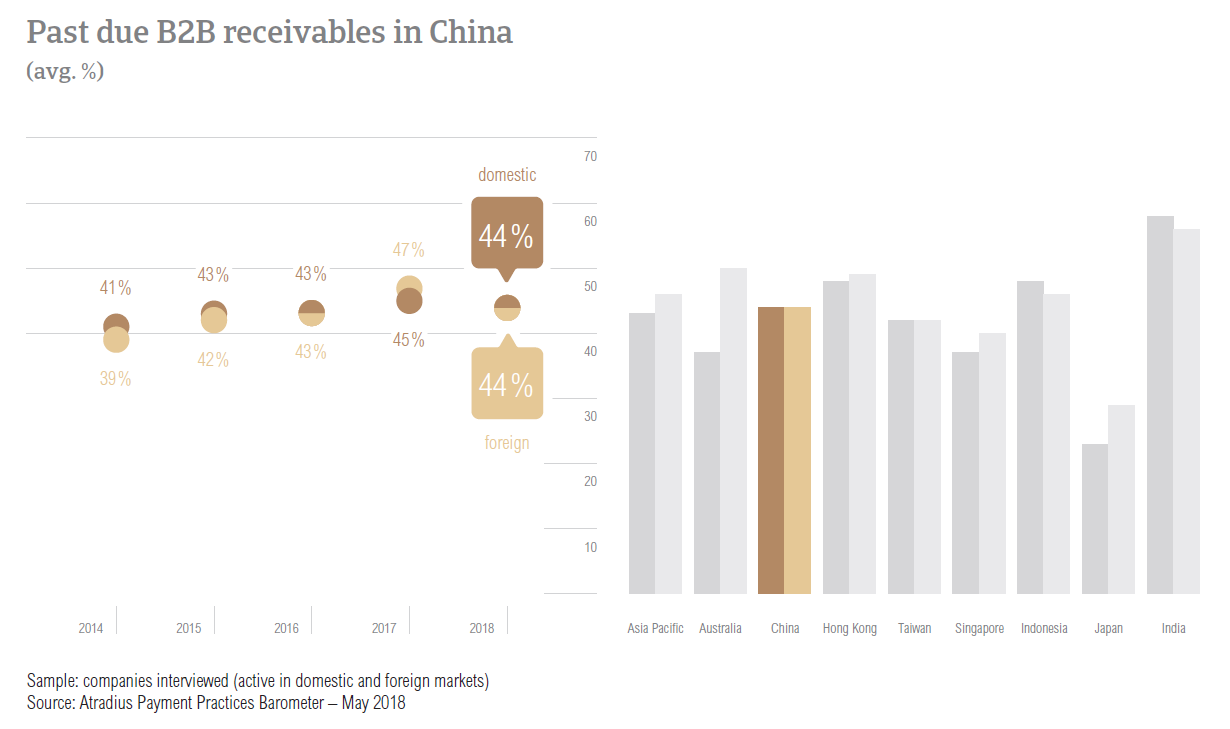
In 2018, the average Days Sales Outstanding (DSO) figure recorded in China is 29 days, four days lower than in 2017. This is the lowest DSO in the Asia Pacific region and is significantly below the regional average of 40 days. Most respondents in China (47.9%) do not expect any changes in their company's DSO figure over the coming 12 months. However, a significant percentage (27.0%) expect a slight increase over the same time frame.
Buyer payment delays often lead to late payments by suppliers
Next to their peers in Indonesia and Australia, respondents in China are setting the shortest average payment terms for their domestic and foreign B2B customers. Domestic B2B customers of respondents in China are given, on average, 27 days to settle their invoices. This is two days longer than in 2017. In contrast, foreign B2B customers are given, on average, 26 days to fulfil their payment obligations – seven days shorter than in 2017.
While 2018 survey results do not highlight differences between average payment terms by customer type, 79% of respondents in China said that they are very likely to differentiate between domestic and foreign B2B customers. Moreover, the majority of respondents, 59.0% said that they would give their domestic B2B customers a shorter time to fulfil their payment obligations. This suggests that the domestic buyers of respondents who give their foreign buyers less time to pay receive significantly more time to pay than the foreign buyers. The main reasons for differentiating payment terms in China are internal policies, industry practices and the economic situation.
Payment delays in China have remained largely stable in 2018, with a decrease of two days reported in respect to domestic B2B customers (on average, 19 days) and no changes in regards to foreign B2B customers (on average, 22 days).
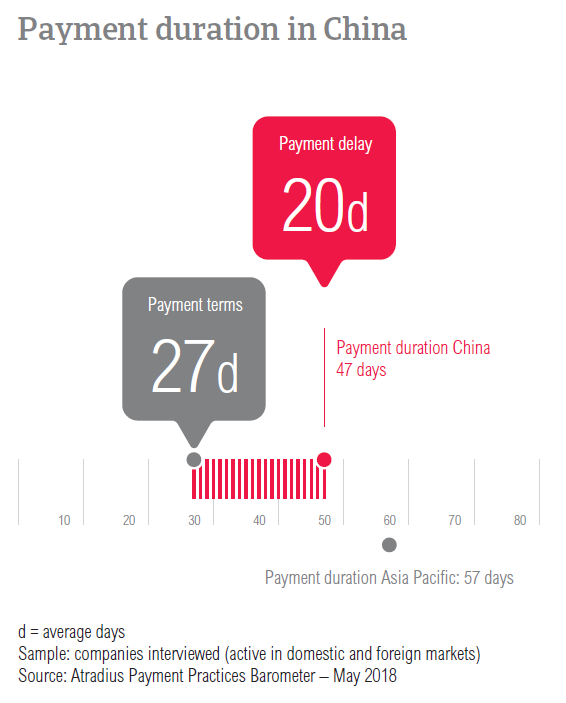
Payment delays by domestic B2B customers seem to occur most often because of insufficient availability of funds. This was stated by 42.4% of respondents. Respondents in China also cited disputes over the quality of goods and services provided (27.7%) and the complexity of the payment procedure (27.1%) as other reasons for domestic payment delays.
While the main reasons for payment delays by domestic B2B customers are largely the same as in 2017, respondents in China reported more changes with payment delays by their B2B customers abroad. In 2018, the main delay factors by B2B customers abroad were the complexity of the payment procedure (reported by 41.0% of respondents) and the inefficiencies of the banking system (reported by 28.2% of respondents). In 2017, the main reasons for foreign B2B payment delays were the inefficiencies of the banking system (reported by 41.9% of respondents) followed by the complexity of the payment procedure (reported by 35.9% of respondents).
A low percentage of respondents in China, 13.3%, said that payment delays did not have a significant impact on their businesses. 28.6% of respondents reported that due to payment delays they needed to postpone payments to their own suppliers and 27.6% said that they needed to take special measures to correct cash flow. For 11.7% of respondents, payment delays led to revenue loss.
E-invoicing: positively impacting payment duration
Next to Singapore, China was the only country in Asia Pacific to experience a decrease in payment duration. More specifically, the average payment duration in China decreased from 51 days in 2017 to 47 days this year. This means that respondents in the country need a shorter time to convert B2B invoices into cash, on average, 10 days less than in Asia Pacific overall.
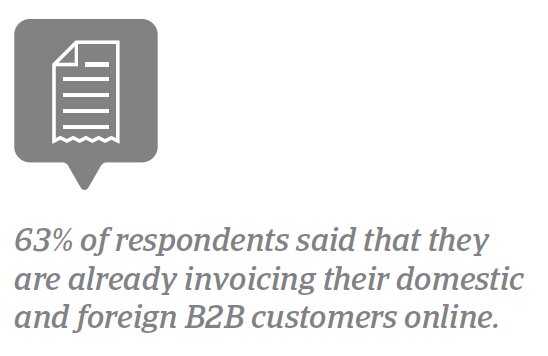
Respondents in China make extensive use of e-invoicing which seems to positively impact payment duration. 63% of respondents said that they are already invoicing their domestic and foreign B2B customers online and 20% said that they intend to start doing so in 2018. In contrast, only 14% of respondents in the country said that they are not using e-invoicing and 3% that they have stopped using it. Of the respondents already using e-invoicing, 81% said that after invoicing their B2B customers electronically, they received payments quicker. For 16% of respondents online invoices did not have a noteworthy effect on payment while 6% of respondents noticed a slowdown in payment.
Respondents in China sure of turnover losses due to global protectionist measures
When asked if the global economic situation will impact their business’s turnover, only 21% of respondents in China said they do not expect to be affected over the coming 12 months. Of the remaining 79% who do expect to be affected, most expect to see a negative effect on turnover of up to 20%.
Together with their peers in Indonesia, respondents in China seem to be the most convinced in Asia Pacific that global protectionist measures are bound to have an effect on their company’s turnover. More specifically, 26% of respondents in China expect as much as a 10% impact on their turnover and 24% of respondents as much as a 20% impact. A notable 17% believe the impact on their business’s turnover will be more significant, between 20% and 30%.
6% of respondents in China – probably focusing primarily on domestic B2B sales – expect to see improvements based on the changes at global level.
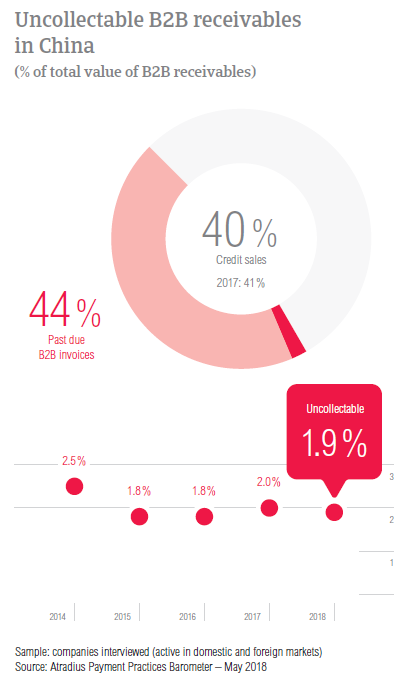
Bankruptcy and failed collection attempts remain top reasons for write-offs
The average proportion of uncollectable B2B receivables in China is stable at 1.9% after 2.0% in 2017. Similarly to what has been reported in the past, B2B receivables here were written off as uncollectable more frequently with domestic B2B customers than with customers abroad.
Uncollectable receivables originated most often from B2B customers in consumer durables, construction, chemicals and services. Similarly to what was stated at regional level, the main reason for writing off B2B receivables as uncollectable is the customer going bankrupt or out of business. In 2018, this was stated by 46.6% of respondents. A second most frequently reported reason for write-offs is the failure of collection attempts, stated by 39.0% of respondents in the country.
Consumer durables remains a problematic sector
B2B customers of respondents in China are given, on average, 27 days to fulfil their payment obligations. Looking at the average payment terms by sector, domestic and foreign B2B customers in the machines sector are given the longest payment terms (on average, 40 days). In contrast, B2B customers in the paper sector (on average, 11 days) and those in business services (on average, 15 days) were asked to fulfil their payment obligations the fastest.
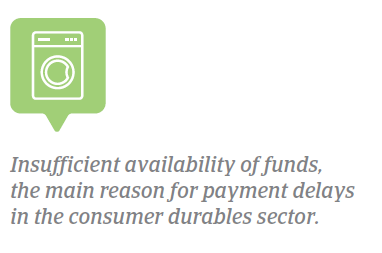
Looking at the longest payment delays by sector, and similarly to 2017 findings, B2B customers in the consumer durables sector are once more mentioned as some of the slowest payers. B2B customers in the chemicals sector also generated long delays. B2B customers in these sectors, paid on average 19 and 21 days late respectively. The main reason for payment delays in the chemicals sector was disputes over the quality of goods delivered or services provided (cited by 35% of respondents). 48% of respondents in the consumer durables sector reported insufficient availability of funds as the main reason for B2B payment delays.
59% of respondents in the chemicals sector and 43% in the consumer durables sector do not expect changes in the payment behaviour of their B2B customers over the coming 12 months. However, they remain optimistic, should a change occur, most respondents expect it to be for the better.

